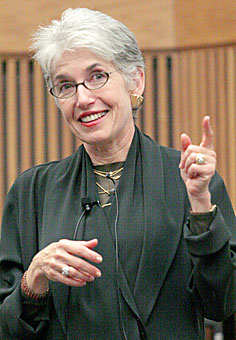 |
|
Jake Lacey/Arizona Daily Wildcat
|
A semester-long lecture series entitled "Astrobiology and the Sacred" debuted Monday evening with a lecture by writer Dava Sobel, author of the books "Longitude" and "Galileo's Daughter." The lecture series is sponsored by the St. Thomas Moore Catholic Newman Center.
|
|
|
By Nick Smith
Arizona Daily Wildcat
Wednesday, January 25, 2006
Print this
Astrobiology theme of this year's lectures
In the wake of disgruntled mall preachers and the launch of the Pluto probe, two new lecture series aim to bridge the gap between science and theology.
The spring semester will play host to the Astrobiology and the Sacred series funded by the John Templeton Foundation, the Metanexus Institute and the St. Albert the Great Forum on Science and Theology sponsored by the St. Thomas More Catholic Newman Center.
The astrobiology series debuted Monday evening with a lecture by writer Dava Sobel, author of the books "Longitude" and "Galileo's Daughter."
Sobel lectured on her most recent book, "The Planets," to a crowd of more than 300.
"Some kids like dinosaurs or insects or planets, or any combination thereof," Sobel said. "Some kids never outgrow it."
Her lecture focused on each chapter of her book, which matched each planet with a theme.
Sobel spoke about some early scientists' belief that the planets related to music, the theme for the Saturn chapter.
"(Astronomers thought) somehow the order of the planets would relate to the order of notes," Sobel said.
While many of Sobel's books are science related, she had no formal science education, saying her interest in writing about astronomy gave her "on-the-job training."
"I got really interested in astronomy as a child and again in my early 20s by going to a public lecture by Carl Sagan," said Sobel, a former science writer for The New York Times.
Monday's lecture was attended by many students with an interest in science.
Hayley Ennis, a sophomore studying biochemistry and molecular biology, said she came to the lecture because she had read one of Sobel's books and had an interest in astrobiology.
"I think it's good (the lectures) are free so everyone can go if they want to," Ennis said as she waited in line to get in.
The Astrobiology and the Sacred series gives people a chance to meet famous authors, scientists, poets and philosophers, said Thomas Fleming, a senior lecturer at the Steward Observatory.
"Part of the Templeton lecture series is to get a dialogue going between the religious and humanities communities and the science community," Fleming said.
The Templeton lecture series is in the second of three years here at the university, said Chris Impey, an astronomy professor and director of the Astrobiology and the Sacred series.
This year's theme is life in the nearby universe. Last year's lecture series focused on the topic of life on earth, Impey said.
"This series brings people from a range of perspectives to come together," Impey said.
The St. Albert lecture series will kick off tonight at 7:30 at the Catholic Newman Center and will feature a discussion between molecular and cellular biology professor Thomas Lindell and William Stoeger of the Vatican Observatory Research Group.
The discussion will cover William Grassie's lecture on intelligent design, which took place last night.
Dates and times for the Astrobiology series can be found at http://scienceandreligion.arizona.edu, and dates for the St. Albert series can be found at http://uanews.org. Both lectures are free and open to the public.
